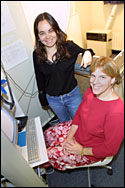Ravel-ing rugrats
At eight months old, Reid LeBlanc already has his preferences in classical music.
 Beatriz Ilari, PhD graduate in the Faculty of Music, and professor Linda Polka, School of Communication Sciences and Disorders
Beatriz Ilari, PhD graduate in the Faculty of Music, and professor Linda Polka, School of Communication Sciences and DisordersPHOTO: Owen Egan |
|
The blue-eyed blond is one of 140 infants who participated in a McGill study to determine whether babies can remember complex music. Turns out Reid and his peers have good memories for the classics, even after a two-week musical break.
The investigation was conducted by Beatriz Ilari, a PhD graduate in the Faculty of Music, in collaboration with Linda Polka, a professor from the School of Communication Sciences and Disorders, as well as a researcher in infant speech perception and bilingualism.
While past studies had established that babies are highly attentive to sounds, Ilari says, her project was launched to specifically explore the crib and diaper set's reaction to music that's deemed complicated by experts. Until now, most music educators recommended babies be exposed to simple songs like Twinkle Twinkle Little Star.
"Our finding that babies can remember a piece of complex music after a two-week interval appears to challenge this implicit assumption that infants are ill-equipped to handle complex music," Ilari says.
Their study now offers researchers and parents a better understanding of how much a baby can process, which could eventually help in the development of curriculum for early childhood education. "Babies are very good listeners," Ilari says. "Question is, why limit what they hear?"
To gather evidence that babies can remember complex music, the research team exposed their study group to one of two piano pieces: Forlane or Prelude from Maurice Ravel's composition Le Tombeau de Couperin. The songs were selected because of their intricate harmonies, complicated rhythm and texture. "We wanted something that was clearly complex," says Polka.
"We also wanted little-known pieces that parents wouldn't know," said Ilari, adding that the babies came from all cross-sections of society. "It had to be new music to the children and parents."
Study babies were given a CD containing either Forlane or Prelude and their parents were asked to play the assigned piece three times per day for 10 consecutive days. Parents also completed a diary to document listening dates, times and baby moods.
Two weeks after their listening period, the diaries were collected and each subject was brought to Polka and Ilari's Beatty Hall lab to determine if they had a listening preference for either Forlane or Prelude. During the tests the babies were seated on a parent's lap in a three-wall booth, while researchers played eight excerpts from the assigned piece, intermingled with eight segments of the unfamiliar song.
To facilitate tests and to capture the children's attention, the researchers mounted two red lights on either side of the booth. One light would blink, either to the left or the right side of the baby.
Once the baby looked at the light, one musical excerpt would be played through a hidden speaker mounted behind the light. The excerpt would be played until the baby turned its head away. "The babies quickly figured out how this worked," says Polka.
In most cases, babies were 20 to 30 percent more attentive to the music piece they had heard at home. "Babies exposed to the Forlane preferred it to the Prelude, while babies exposed to the Prelude piece preferred it over the Forlane," Ilari explains.
The researchers tested an additional group of babies who had never heard either song. Ilari says these babies showed no preferences for either Ravel composition. "These results show that babies had formed an impression of the piano piece and were able to retain this impression over a two-week interval," she says.
The researchers stress they don't know what information the babies retained from their exposure to either simple or complex music. "Was it the melody, or some more global acoustic features of the music?" Ilari asks. "This will require further investigation."
Polka and Ilari have now launched a second investigation to answer their remaining queries. They are currently testing babies on their appreciation of simple versus complicated Chinese songs.
Already, a theme is emerging from both studies, says Polka. "Our evidence is showing that babies are more auditorially sophisticated and picking up much more than [researchers] suspected. Babies can benefit from being exposed to a wide variety of auditive experiences."
For more information on registering a baby to participate in a future study, please call 514-398-1210 or consult www.medicine.mcgill.ca/infantspeechlab.

